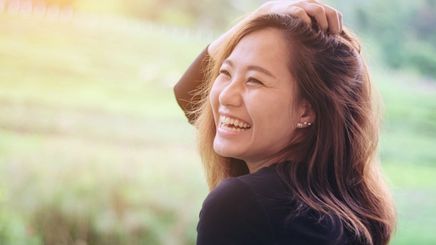
A little bit of hair fall is normal, and the average amount varies from person to person. However, it's safe to expect to lose more or less 100 to 150 strands a day. Depending on various circumstances, like diet, medication, stress, some women can experience an unusual amount of hair fall from time to time. Visit your doctor to get an accurate diagnosis. But if you have naturally thin hair or are experiencing regular hair fall, here are some tips on how to thicken hair. Did you know that food can play an important role in your hair quality?
What Causes Thin Hair?
According to Harvard Health, at least a third of women experience thinning hair. In men, hereditary hair loss is the most common cause of thinning hair. Unlike men, women can have without going bald. This type of hair loss can be associated with inflammatory conditions in the body, or female-pattern hair loss, which can be caused by genetics, hormones, and age.
The American Academy of Dermatology notes that not all hair loss is permanent, and eating foods containing hair-strengthening nutrients can help thicken hair.
Foods for Healthier Hair
Based on the Journal of Investigative Dermatology, is shiny, smooth in texture, has no , is elastic, and can withstand a little bit of tension without breaking. Here are some foods that promote healthy hair and can help with hair loss.
Load up on beta-carotene with carrots.
Carrots are rich in two nutrients that promote hair health and growth: beta-carotene, which the body converts to vitamin A, and biotin. Beta-carotene encourages sebum production in the scalp, promoting moisturized and shiny hair. The National Institutes of Health says that biotin or vitamin B7, meanwhile, promotes thicker hair.
Get your iron from eggs.
Eggs are high in protein and iron, which are essential to hair loss prevention. In a study published in the American Journal of Epidemiology, iron deficiency is the most common cause of hair loss or thinning hair in women. In addition, growing hair follicles require a lot of iron, and women who regularly have heavy periods tend to be iron deficient.
Replenish your protein supply with salmon.
Salmon contains Vitamin D, omega-3 fatty acids, and protein. The AAD states that Vitamin D aids in stimulating and nourishing the hair follicles, while omega-3 fatty acids lubricate the scalp and prevent hair breakage. Protein is essential for tissue repair and the construction of new tissues. If your body lacks protein, it rations the protein that it has and cuts off the supply to the hair follicles. This leads to dry, brittle strands that break and fall off easily.
Boost hair growth with oysters.
Based on the National Institutes of Health, oysters contain more zinc than any other food. Zinc is essential to hair growth by promoting sebum production around the hair shaft. People who have a zinc deficiency can suffer from , hair loss, or slow hair growth. Since the body doesn’t make its own zinc, you can add it to your diet by eating more oysters. Zinc can also be found in lean meats, poultry, eggs, other seafood, beans, peas, nuts, and soy products.
Products That Can Help Thicken Hair
According to the National Institutes of Health, applying oils such as argan and marula on hair helps lubricate strands. It also makes them more manageable and prevents dryness that can lead to breakage. Oils also help keep the scalp healthy and reduce hair fall.
Cream Silk Ultimate Reborn Long and Luscious Conditioner contains Tri-Oleo Complex, a formula of lightweight oils — rosehip oil, argan oil, and marula oil — that help smoothen, moisturize, and strengthen hair.
You can also add biotin to your hair-care regimen with Sunsilk Strong & Long Shampoo. Biotin and aloe vera work together to deeply nourish hair and help it grow stronger.
If you’re wondering how to thicken hair, couple a nourishing hair care routine with a nutritious diet. Remember, the stronger your hair, the longer it grows, so focus on health and strength over length.